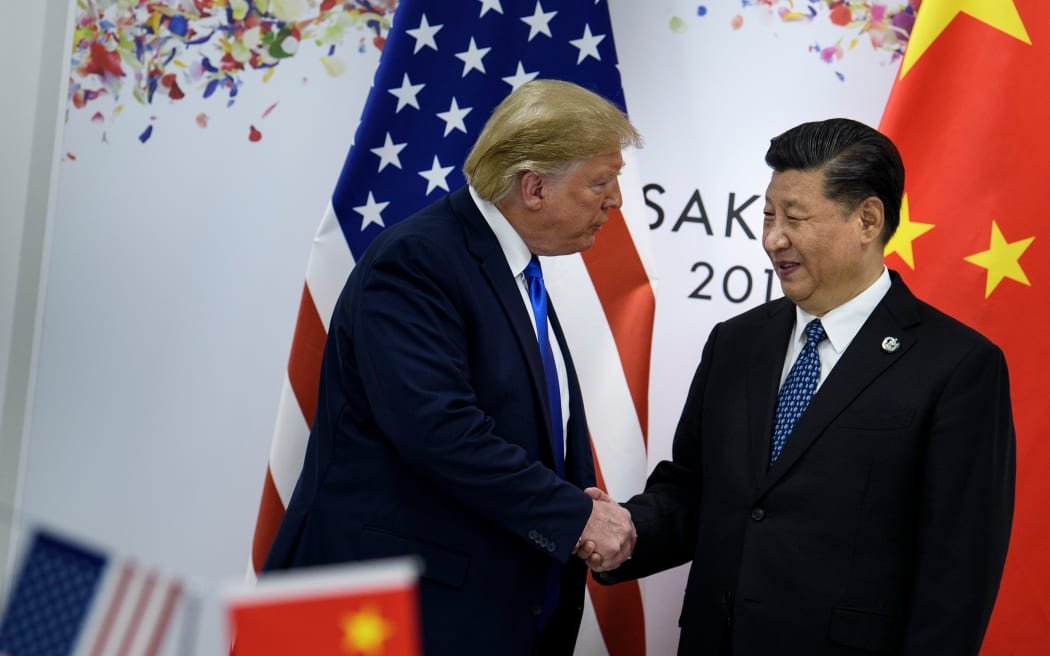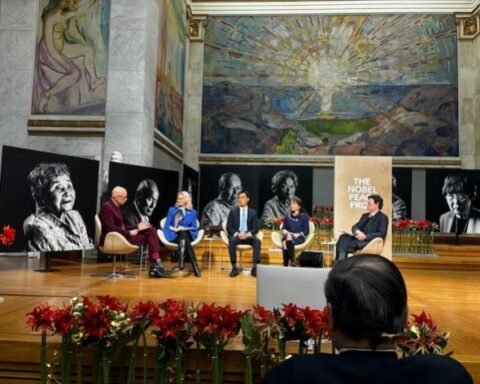Overshadowing former presidents, members of Congress, and military officials, an extraordinary VIP guest watches as Donald Trump vows to uphold, defend, and defend the Constitution on the same site where his fans rioted four years ago.
The hardline leader of China, Xi Jinping, is bundled up to stave off the winter cold. Nearly everyone on the inaugural platform views China as an existential challenge to US superpower domination as the Cold War of the twenty-first century heats up.
Although Trump’s surprise invitation to the leader of the Chinese Communist Party for a second inauguration he intends to make a powerful global statement, it was clear it could not happen even before sources indicated Xi wouldn’t attend on Thursday.
It would be politically impossible for the Chinese leader to get Xi to fly across the world, as it would be a huge coup for the president-elect. The Chinese president would be forced to honor Trump and American might during such a visit, which would go against his goal of China assuming its due place as the world’s leading power. Without the ability to respond, Xi would be compelled to sit through the inauguration ceremony and listen to Trump’s remarks without any control over what the new president would say. Additionally, Xi’s presence would be interpreted as supporting a democratic handover of power, which is unacceptable to an autocrat in a one-party state who is fixated on stifling free speech.
Nevertheless, even in the absence of a positive reaction, Trump’s invitation to Xi is a noteworthy event that illuminates the president-elect’s self-assurance and aspirations as he assumes office ahead of his second term. In a departure from tradition, Trump has also been asking other international leaders if they would like to attend the inauguration, according to CNN’s crew covering him.
This serves as a reminder of Trump’s penchant for foreign policy through extravagant gestures and his readiness to violate diplomatic protocols with his capricious demeanor. Trump’s belief that his personality alone can be a deciding element in establishing diplomatic breakthroughs is further demonstrated by Xi’s invitation. He is by no means the only president to take this tack — which rarely works since hostile US adversaries make hardnosed choices on national interest rather than vibes.
The president-elect has spent the last few weeks assembling a highly hawkish foreign policy team, including Florida Senator Marco Rubio as his pick for secretary of state and Florida Representative Mike Waltz as his national security adviser. These individuals view China as a multifaceted threat to the United States, including economically, militarily, and even in space, which makes his invitation to Xi all the more intriguing.
Trump has made a very intriguing move that is in keeping with his tendency towards surprise. Lily McElwee, deputy director and fellow in the Freeman Chair in China Studies at the Centre for Strategic and International Studies (CSIS), remarked, “I don’t think anyone expected this.” According to McElwee, the offer should be viewed in light of the president-elect’s use of rewards and penalties as he prepares to assume control of the most important diplomatic relationship in the world. This carrot is quite inexpensive. It’s a symbolic carrot that slightly upsets the balance of the relationship without jeopardizing US interests.
As authorities want to strengthen the already severe stance taken by the Biden administration, which built on a stiffening of policy during the first Trump term, Trump’s outreach to Xi comes as predictions grow that tense US-China relations will worsen even more under the incoming administration.
The rivals are fighting over Taiwan, an island democracy that China considers to be part of its territory, and that, should Xi order an invasion, the US may or may not defend. Along with Russia, North Korea, and Iran, China is expanding its collaboration with other adversaries of the United States in an unofficial anti-Western alliance. The two major Pacific countries’ air and naval forces frequently approach conflicts in the South and East China Seas quite closely.
Lawmakers in both parties accuse China of stealing US economic and military secrets and of failing to live up to international law and trading rules.
Since Trump has already threatened to impose crushing tariffs on China, his attempt to coax Xi to Washington seems like a massive contradiction. It begs the following question as foreign governments puzzle over how to handle the new US president: How seriously should US allies and adversaries take his bullying tone and volatile policy shifts? Is the true American approach characterized by his hardline officials and policies or is it more accurately represented by the president-elect’s head-spinning moves, which reveal a zeal for deals and sitting at the negotiating table with the world’s tough-guy leaders?
Trump’s first big move in China relations
Trump’s most recent strategy may seem disorganized, but it doesn’t mean it can’t succeed.
Trump’s unpredictable behavior is frequently criticized by his detractors, but his spontaneous actions can throw opponents off-balance and provide the US an advantage. For example, regardless of other US disputes with China, any success he has in separating Xi from Iran, Russia, and North Korea would be a significant foreign policy triumph.
However, it’s reasonable to wonder if the ferocity of his first term’s foreign policy produced long-lasting effects.
Trump’s perceptions of China are particularly perplexing because he seems to think that Beijing has been defrauding America for decades and that its mercantilist practices pose a direct threat to the US. He still wishes to be friends with Xi, though. Throughout his campaign, Trump emphasized that Xi was intelligent and tough and that they were friends. It seems that Trump thought that by being friendly, the Chinese leader would think the same of him.
In a Thursday interview with Jim Cramer on CNBC, Trump summed up this inconsistency in a single sentence. “We have been talking and discussing a number of topics with President Xi and other world leaders, and I believe we will do very well overall,” Trump stated. However, he added: “We’ve been abused as a country. We’ve been badly abused from an economic standpoint.”
Throughout his first term, Trump consistently undermined his administration’s severe policies, particularly with strongmen like Xi, Russian President Vladimir Putin, Turkish President Recep Tayyip Erdogan, and Kim Jong Un of North Korea. At times, it seemed like he picked sides just because everyone told him not to.
In his book “At War with Ourselves,” H.R. McMaster, a former national security adviser to Trump, pointed out that this was particularly true with Putin. “Trump was overconfident in his ability to improve relations with the dictator in the Kremlin, just like his predecessors George W. Bush and Barack Obama,” McMaster wrote. The self-described “expert dealmaker,” Trump, thought he could establish a personal connection with Putin. Trump’s innate contrarian tendencies only strengthened his resolve. The majority of Washington’s foreign policy professionals favored a firm stance against the Kremlin, which only served to push the president in the other direction.
Trump may have been motivated by such contrarianism when he extended an early olive branch to Xi. Additionally, even if the first-term bilateral agreement was a complete failure, the president-elect can anticipate a new trade agreement with Beijing. He signed a Phase One trade agreement in late 2019 that was heralded as “historic,” but it never materialized. The Covid-19 pandemic that began in the Chinese city of Wuhan months later caused Trump to turn sharply against Xi, but it was never evident that Xi ever planned to fully implement what Trump claimed were massive purchases of US manufacturing, energy, and agricultural products as well as a large-scale economic structural change. Xi hasn’t modified his mind, according to any evidence.
Trump’s tariff plan is also under scrutiny since it is unclear if a president who is reluctant to harm his supporters is willing to incur the electoral costs associated with such a course of action. Even if he maintained that tariffs would ultimately cost Beijing billions of dollars, US retailers would still pass on higher import prices to customers, including those who believed Trump had the greatest chance to lower the exorbitant cost of groceries.
Another query is whether Trump views tariffs as a legitimate act of economic warfare or as a bargaining ploy. His threats against friends like Canada or the European Union, according to many commentators, are merely intended to strengthen his negotiation position.
“With China, we remain uncertain as to whether tariff threats are intended to unilaterally decouple the US and Chinese economies or serve as negotiating leverage towards a deal,” McElwee stated.
It appears that Beijing is paying attention to Trump. It has been preparing retaliatory tools in the weeks following Trump’s election. It declared on Wednesday that it was looking into US semiconductor manufacturer Nvidia for antitrust violations. China prohibited the sale of a number of rare minerals to the United States, which is another front in the tech war. In order to protect economic growth from any conflicts with Trump, it also promised on Thursday to raise the budget deficit, borrow more money, and relax monetary policy.







